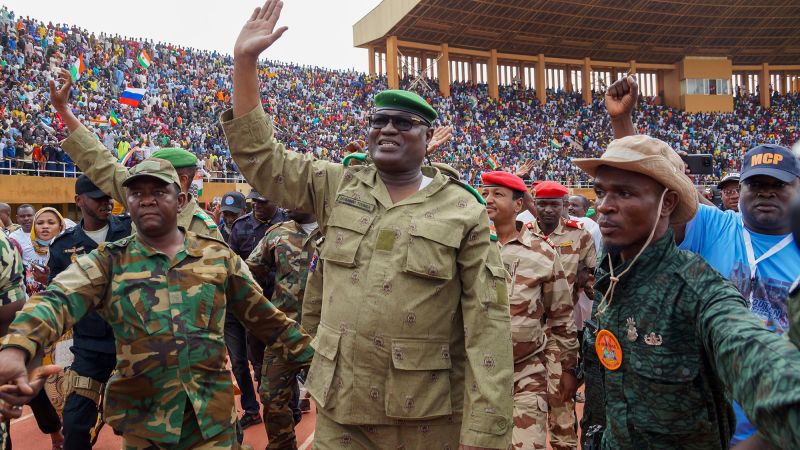
Niger military deploys reinforcements to capital after ignoring deadline to cede power
A convoy of about 40 pick-up trucks arrived at nightfall on Sunday evening, bringing troops from other parts of the country to both reassure a nervous public and prepare for potential battle.
Niger has been engulfed in political chaos since late last month, when President Mohamed Bazoum was ousted in a coup d’etat by the presidential guard. The Economic Community of West African States (ECOWAS) responded days later by enacting sanctions and issuing an ultimatum to the ruling military junta: stand down within a week or face a potential military intervention.
That deadline came and went Sunday without any change in the political situation. Bazoum remains deposed and his whereabouts are still unknown to the public. The National Council for the Safeguard of the Homeland, the junta’s formal name, is still effectively in charge of Niger. A junta leader said Sunday that Niger’s armed forces would be closing the country’s airspace due to the threat of military intervention.
What comes next is unclear. ECOWAS leaders say their preference is find a diplomatic solution to the crisis but have maintained they willing to resort to the use of force as a last resort to return Niger’s democratically elected government to power. The bloc is set to hold another meeting on the situation on Thursday.
ECOWAS head and former President of Liberia Ellen Johnson Sirleaf said Monday that she believes the group will be able to find a resolution to the situation in Niger.
She added that ECOWAS would not “take any step that would result in a destruction of countries, or the death of people.”
UN Secretary General António Guterres on Monday meanwhile said he was “concerned” over Bazoum’s continued detention, according to a statement from his spokesperson.
Uncertainty in Niamey
The uncertainty has rattled residents in Niamey, the capital. Some people flocked to supermarkets purchase staples like rice and cooking oil in bulk, while others attempted to flee. Employees of local bus companies said most lines out of the capital were fully booked.
At the busy Wadata market, east of the capital’s center, many shoppers buying food and necessities Monday voiced apprehension about what might come.
“Our country is in the process of falling into a crisis that we have never experienced, we’re really afraid,” said Mariama Sabo, a 31-year-old cleaner.
Salifou, a 27-year-old fruit seller, worried for his business. He imports his produce from Benin, but the border between the two countries is now closed.
“My stock is entirely depleted and that really worries me,” Salifou said.
Others shared concerns about the rising cost of food.
“The authorities should show some sense of responsibility towards us or else it’s going to be difficult,” a woman named Salamatou said. “They have to bring peace, but also bring prices down.”
Pro-junta demonstrators, meanwhile, gathered Sunday at a 30,000-seat stadium in Niamey to voice their support for the military government and their opposition to ECOWAS sanctions.
Despite its wealth of resources, Niger remains one of the poorest countries in the world. Many Nigeriens, especially in the younger generation, still see France as an imperial power responsible for the prevailing poverty levels in their country. Those who back the new military government see its rule as an opportunity to distance itself diplomatically from French influence.
Ali Maikano, a bricklayer living in the capital, said he was ready to fight alongside the army to push back against French interests in the country.
The future of Niger’s elected government is of particular importance to the country’s democratic neighbors and Western partners. The United States and France stationed hundreds of troops, many of whom assist with counterterrorism missions, on the basis that Niger was a relatively stable democracy in a region fraught with political upheaval, terrorism and Islamist insurgencies.
The State Department has had direct contact with military junta leaders in Niger “urging them to step aside” in the last week to ten days, State Department spokesperson Matthew Miller said on Monday.
“There has been direct contact with military leaders. I’m not going to say at what level or with whom, but there has been direct contact with military leaders urging them to step aside,” Miller said.
Pressed on if the State Department has sent a point person to Niger to handle the country’s ongoing crisis, Miller would not get into any specific trips or meetings. Miller said that Secretary of State Antony Blinken and other senior officials have been “involved in conversations and we’ll continue to have senior officials involved in conversations.”
Russia has attempted in recent years to capitalize on the geopolitical situation in West Africa to gain clout and influence, especially through the mercenary group Wagner. Wagner has a presence in several countries, including in neighboring Mali, where a military government took charge after a coup in 2021. Wagner forces have been contracted to help local defense forces against rebellions and insurgencies, and suppress opposition.
The French Foreign Ministry said that Wagner had been in touch with the coup leaders in Niger, but it was unclear if the two sides were moving toward a partnership.
“We can see that Wagner is in an opportunistic and predatory logic, so they may be tempted to take advantage of the whole situation,” a spokesperson for the ministry told journalists.
Shortly after the putsch, Wagner leader Yevgeny Prigozhin celebrated the coup and appeared to pitch the private military company to Niger’s new leaders.
Niger’s democratic neighbors worry the coup could have a domino effect given the fragility of West African democracies like those in Mali and Burkina Faso, where a coup took place in 2022.
Both countries are now backing the Nigerien junta. They said in a joint statement last week that they would consider any military intervention in Niger “an act of war” against all three countries.
Both countries are sending delegations to Niger’s capital Niamey, “in solidarity with the people of Niger,” according to the Malian Armed Forces.
